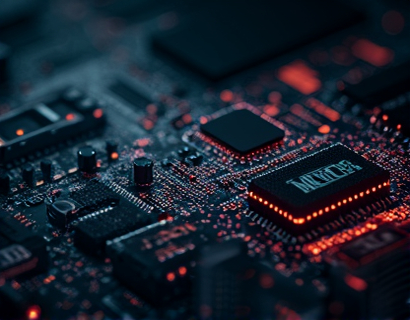Decentralized Business Transactions: Streamlining Interactions with Advanced dApp Solutions
In the rapidly evolving landscape of digital commerce, the integration of decentralized applications (dApps) and blockchain technology is redefining the way businesses and individuals interact. These innovative solutions offer a secure, transparent, and efficient platform for conducting business logic transactions, setting a new standard in the realm of digital interactions. This article delves into the transformative impact of dApps, focusing on how they streamline complex transactions and empower users in the decentralized economy.
The concept of decentralized applications has gained significant traction in recent years, driven by the success of blockchain technology. Unlike traditional centralized systems, dApps operate on a distributed network, eliminating the need for intermediaries and reducing the risk of single points of failure. This decentralized nature ensures that transactions are not only secure but also transparent, as all actions are recorded on a public ledger accessible to all participants.
One of the key advantages of dApps in business transactions is the enhancement of trust among users. In a centralized system, trust is placed in a single entity, which can be a vulnerability. With dApps, trust is distributed across the network, reducing the likelihood of fraud and enhancing the overall reliability of transactions. This shift towards a trustless environment is particularly beneficial for businesses operating in industries where transparency and accountability are paramount.
The architecture of a typical dApp involves smart contracts, which are self-executing contracts with the terms of the agreement directly written into code. These smart contracts automatically enforce and execute the terms of a transaction when predefined conditions are met. This automation not only speeds up the process but also minimizes the potential for human error and manipulation. For instance, in a supply chain scenario, smart contracts can ensure that payments are released only when goods are delivered and verified, streamlining the entire process.
Another critical aspect of dApps is their ability to facilitate peer-to-peer interactions without the need for intermediaries. This direct connection reduces transaction costs and increases efficiency. For example, in the financial sector, dApps can enable users to conduct cross-border payments instantly and at a fraction of the cost compared to traditional banking systems. The elimination of middlemen also means that users retain full control over their assets and data, enhancing privacy and security.
Moreover, dApps provide a level of customization and flexibility that is unmatched by traditional systems. Developers can create tailored solutions that meet specific business needs, integrating various functionalities such as identity verification, asset management, and governance mechanisms. This adaptability makes dApps an attractive option for businesses looking to innovate and stay competitive in a rapidly changing market.
The benefits of dApps extend beyond just transaction efficiency. They also play a crucial role in democratizing access to financial services. In regions where traditional banking infrastructure is lacking, dApps can provide essential financial tools and services to underserved populations. By leveraging blockchain technology, these applications can offer secure and accessible ways to store value, borrow, lend, and invest, thereby promoting financial inclusion.
However, the adoption of dApps is not without challenges. One of the primary hurdles is the technical complexity associated with blockchain and smart contracts. Many businesses and individuals lack the necessary expertise to develop and manage dApps effectively. To address this, a growing ecosystem of developers, consultants, and platforms is emerging to provide support and resources, making it easier for non-technical users to harness the power of decentralized applications.
Another challenge is the scalability of blockchain networks. As the number of transactions increases, some blockchain platforms struggle to maintain performance and throughput. However, ongoing research and development in areas such as layer 2 solutions, sharding, and new consensus mechanisms are addressing these issues, paving the way for more scalable and efficient dApps.
The integration of dApps with other emerging technologies, such as the Internet of Things (IoT) and artificial intelligence (AI), is further enhancing their capabilities. For instance, IoT devices can automatically trigger smart contracts based on real-time data, creating seamless and automated workflows. AI can be used to analyze transaction patterns and predict potential risks, adding an extra layer of security and intelligence to dApp transactions.
In the context of business logic transactions, dApps offer a robust framework for automating complex processes. Consider a scenario in the real estate industry, where a dApp can facilitate the entire transaction workflow, from listing a property to completing the purchase. Smart contracts can handle tasks such as verifying the seller's identity, ensuring the property's ownership, processing payments, and updating the property registry. Each step is recorded on the blockchain, providing an immutable and transparent record of the transaction.
Similarly, in the healthcare sector, dApps can streamline the management of patient data and medical records. By using blockchain-based dApps, patients can have full control over their health information, sharing it securely with healthcare providers as needed. Smart contracts can ensure that data access is granted only under specific conditions, enhancing patient privacy and data integrity.
The potential applications of dApps are vast and varied, extending to industries such as supply chain management, voting systems, and digital identity verification. In each case, the core principles of decentralization, transparency, and automation remain the driving forces behind the transformative impact of these applications.
As the adoption of dApps continues to grow, it is essential for businesses and individuals to stay informed about the latest developments and best practices. Education and community support play a vital role in fostering a deeper understanding of decentralized technologies and their practical applications. Online forums, workshops, and conferences are increasingly focusing on dApps, providing valuable resources for those looking to explore this exciting frontier.
In conclusion, decentralized applications are revolutionizing the way business logic transactions are conducted, offering a secure, transparent, and efficient alternative to traditional centralized systems. By leveraging the power of blockchain and smart contracts, dApps empower users to interact and transact with unprecedented ease and trust. As the technology matures and becomes more accessible, the potential for innovation and growth in the decentralized economy is immense, setting a new standard for digital commerce in the age of advanced dApp solutions.










































